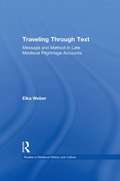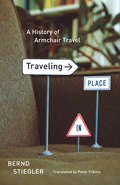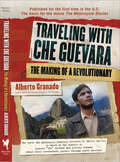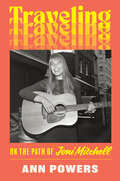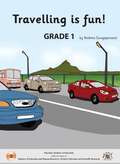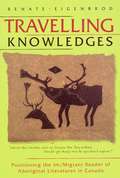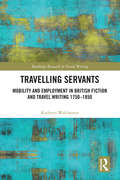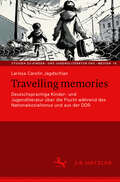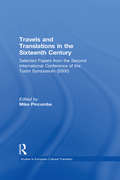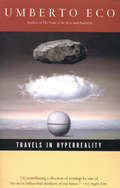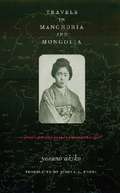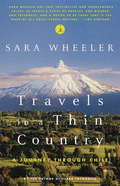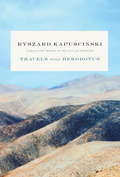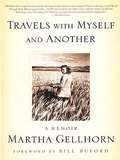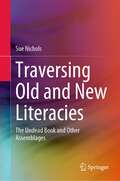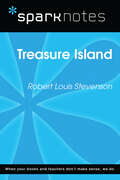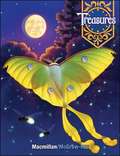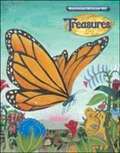- Table View
- List View
Traveling Through Text: Message and Method in Late Medieval Pilgrimage Accounts (Studies in Medieval History and Culture)
by Elka WeberTraveling through Text compares religious ravel writing by Muslims, Christians and Jews in later Middle Ages. This comparative approach allows us to see that writers in all three religious communities used travel writing in the same way, to shape the perceptions of their readers by asserting the author's authority. The central paradox of religious travel writing is that the travel writer reads about a place, usually in a sacred text, decide to supplement the reading with the empirical experience of visiting and describing the place, and the creates his own descriptive text. But in writing this new book, and in letting his readers know his authorial authority, the travel writer himself is daring the reader to challenge the new text. Is a book ever enough? For societies that value their sacred texts, this question is a challenge. But it is a challenge posed by writers who live firmly in the religious tradition.
Traveling in Place: A History of Armchair Travel
by Bernd Stiegler translated by Peter FilkinsArmchair travel may seem like an oxymoron. Doesn't travel require us to leave the house? And yet, anyone who has lost herself for hours in the descriptive pages of a novel or the absorbing images of a film knows the very real feeling of having explored and experienced a different place or time without ever leaving her seat. No passport, no currency, no security screening required--the luxury of armchair travel is accessible to us all. In Traveling in Place, Bernd Stiegler celebrates this convenient, magical means of transport in all its many forms. Organized into twenty-one "legs"--or short chapters--Traveling in Place begins with a consideration of Xavier de Maistre's 1794 Voyage autour de ma chambre, an account of the forty-two-day "journey around his room" Maistre undertook as a way to entertain himself while under house arrest. Stiegler is fascinated by the notion of exploring the familiar as though it were completely new and strange. He engages writers as diverse as Roussel, Beckett, Perec, Robbe-Grillet, Cortázar, Kierkegaard, and Borges, all of whom show how the everyday can be brilliantly transformed. Like the best guidebooks, Traveling in Place is more interested in the idea of travel as a state of mind than as a physical activity, and Stiegler reflects on the different ways that traveling at home have manifested themselves in the modern era, from literature and film to the virtual possibilities of the Internet, blogs, and contemporary art. Reminiscent of the pictorial meditations of Sebald, but possessed of the intellectual playfulness of Calvino, Traveling in Place offers an entertaining and creative Baedeker to journeying at home.
Traveling in Place: A History of Armchair Travel
by Bernd StieglerArmchair travel may seem like an oxymoron. Doesn’t travel require us to leave the house? And yet, anyone who has lost herself for hours in the descriptive pages of a novel or the absorbing images of a film knows the very real feeling of having explored and experienced a different place or time without ever leaving her seat. No passport, no currency, no security screening required—the luxury of armchair travel is accessible to us all. In Traveling in Place, Bernd Stiegler celebrates this convenient, magical means of transport in all its many forms. Organized into twenty-one “legs”—or short chapters—Traveling in Place begins with a consideration of Xavier de Maistre’s 1794 Voyage autour de ma chambre, an account of the forty-two-day “journey around his room” Maistre undertook as a way to entertain himself while under house arrest. Stiegler is fascinated by the notion of exploring the familiar as though it were completely new and strange. He engages writers as diverse as Roussel, Beckett, Perec, Robbe-Grillet, Cortázar, Kierkegaard, and Borges, all of whom show how the everyday can be brilliantly transformed. Like the best guidebooks, Traveling in Place is more interested in the idea of travel as a state of mind than as a physical activity, and Stiegler reflects on the different ways that traveling at home have manifested themselves in the modern era, from literature and film to the virtual possibilities of the Internet, blogs, and contemporary art. Reminiscent of the pictorial meditations of Sebald, but possessed of the intellectual playfulness of Calvino, Traveling in Place offers an entertaining and creative Baedeker to journeying at home.
Traveling with Che Guevara: The Making of a Revolutionary (Shooting Script Ser.)
by Alberto GranadoPublished for the first time in the U.S.—one of the two diaries on which the movie The Motorcycle Diaries is based—the moving and at times hilarious account of Che Guevara and Alberto Granado's eight-month tour of South America in 1952.In 1952 Alberto Granado, a young doctor, and his friend Ernesto Guevara, a 23-year-old medical student from a distinguished Buenos Aires family, decided to explore their continent. They set off from Cordoba in Argentina on a Norton 500cc motorbike and traveled through Chile, Peru, Colombia, and Venezuela. The duo's adventures vary from the suspenseful (stowing away on a cargo ship, exploring Incan ruins) to the comedic (falling in love, drinking, fighting...) to the serious (volunteering as firemen and at a leper colony). They worked as day laborers along the way—as soccer coaches, medical assistants, and furniture movers. The poverty and exploitation of the native population started the process that was to turn Ernesto—the debonair, fun-loving student—into Che, the revolutionary who had a profound impact on the history of several nations.Originally published in Spanish in Cuba in 1978, the first English translation was published by Random House UK in 2003. The movie, based on Granado's and Che's diaries, directed by Walter Salles (Central Station, Behind the Sun), was produced by Robert Redford and others. Shown at the Sundance Film Festival, it generated great reviews and a frenzied auction for distribution rights, which was won by Focus Features. Granado, now 82, was a consultant to Salles during the production. 10 b/w photos.
Traveling: On the Path of Joni Mitchell
by Ann Powers*An Observer Best New Biographies of 2024*Celebrated NPR music critic Ann Powers explores the life and career of Joni Mitchell in a lyrical style as fascinating and ethereal as the songs of the artist herself..“What you are about to read is not a standard account of the life and work of Joni Mitchell. Instead, it’s a tale of long journeying through a life that changed popular music: of a homesick wanderer forging ahead on routes of her own invention, and of me on her trail, heading toward the ringing of her voice.”—From the introductionFor decades, Joni Mitchell’s life and music have enraptured listeners. One of the most celebrated artists of her generation, Mitchell has inspired countless musicians—from peers like James Taylor, to inheritors like Prince and Brandi Carlile—and authors, who have dissected her music and her life in their writing. At the same time, Mitchell has always been a force beckoning us still closer, as—with the other arm—she pushes us away. Given this, music critic Ann Powers wondered if there was another way to draw insights from the life of this singular musician who never stops moving, never stops experimenting.In Traveling, Powers seeks to understand Mitchell through her myriad journeys. Through extensive interviews with Mitchell's peers and deep archival research, she takes readers to rural Canada, mapping the singer’s childhood battle with polio. She charts the course of Mitchell’s musical evolution, ranging from early folk to jazz fusion to experimentation with pop synthetics. She follows the winding road of Mitchell’s collaborations with other greats, and the loves that emerged along the way, all the way through to the remarkable return of Mitchell to music-making after the 2015 aneurysm that nearly took her life.Along this journey, Powers’ wide-ranging musings on the artist’s life and career reconsider the biographer’s role and the way it twines against the reality of a fan. In doing so, Traveling illustrates the shifting nature of biography, and the ultimate contradiction of celebrity: that an icon cannot truly, completely be known to a fan.Kaleidoscopic in scope, and intimate in its detail, Traveling is a fresh and fascinating addition to the Joni Mitchell canon, written by a biographer in full command of her gifts who asks as much of herself as of her subject.
Travelling Concepts in the Humanities
by Mieke BalAttempting to bridge the gap between specialised scholarship in the humanistic disciplines and an interdisciplinary project of cultural analysis, Mieke Bal has written an intellectual travel guide that charts the course 'beyond' cultural studies. As with any guide, it can be used in a number of ways and the reader can follow or willfully ignore any of the paths it maps or signposts.Bal's focus for this book is the idea that interdisciplinarity in the humanities - necessary, exciting, serious - must seek its heuristic and methodological basis in concepts rather than its methods. Concepts are not grids to put over an object. The counterpart of any given concept is the cultural text or work or 'thing' that constitutes the object of analysis. No concept is meaningful for cultural analysis unless it helps us to understand the object better on its own terms.Bal offers the reader a sustained theoretical reflection on how to 'do' cultural analysis through a tentative practice of doing just that. This offers a concrete practice to theoretical constructs, and allows the proposed method more accessibility.
Travelling Is Fun! class 1 - MIE
by Reshma Gungapersand"Travelling Is Fun!" unfolds the adventures of Ben, as he embarks on a journey to the airport. En route, he eagerly observes a vibrant array of vehicles, from a big red bus to motorcycles and bicycles, delighting in the unique experiences each mode of transport offers. Upon reaching the airport, Ben's excitement soars as he witnesses the swift flight of an airplane, dreaming of his upcoming journey high in the sky to England. In England, he anticipates the thrill of train travel, weaving in and out of stations, sparking his excitement even further. Through engaging illustrations and simple yet descriptive language, the book captures the allure of travel, igniting a sense of adventure and discovery in young readers.
Travelling Knowledges: Positioning the Im/Migrant Reader of Aboriginal Literatures in Canada
by Renate EigenbrodIn the context of de/colonization, the boundary between an Aboriginal text and the analysis by a non-Aboriginal outsider poses particular challenges often constructed as unbridgeable. Eigenbrod argues that politically correct silence is not the answer but instead does a disservice to the literature that, like all literature, depends on being read, taught, and disseminated in various ways. In Travelling Knowledges, Eigenbrod suggests decolonizing strategies when approaching Aboriginal texts as an outsider and challenges conventional notions of expertise. She concludes that literatures of colonized peoples have to be read ethically, not only without colonial impositions of labels but also with the responsibility to read beyond the text or, in Lee Maracle's words, to become "the architect of great social transformation." Features the works of: Jeannette Armstrong (Okanagan), Louise Halfe (Cree), Margo Kane (Saulteaux/Cree), Maurice Kenny (Mohawk), Thomas King (Cherokee, living in Canada), Emma LaRocque (Cree/Metis), Lee Maracle (Sto:lo/Metis), Ruby Slipperjack (Anishnaabe), Lorne Simon (Miíkmaq), Richard Wagamese (Anishnaabe), and Emma Lee Warrior (Peigan).
Travelling Servants: Mobility and Employment in British Travel Writing 1750- 1850 (Routledge Research in Travel Writing)
by Kathryn WalchesterThis book outlines the contribution made by servants to domestic and Continental travel and travel writing between 1750 and 1850. Aiming to re-position British and European travel during this period as a site of work as well as leisure, Katheryn Walchester provides commentary and analysis of texts by servants not addressed in current scholarship. By reading texts contrapuntally, this book draws attention to repeated tropes and common patterns in the ways in which servants are featured in travelogues; and in so doing, offers an account of alternative modes of experiencing and writing about the Home Tour and the Grand Tour.
Travelling memories: Deutschsprachige Kinder- und Jugendliteratur über die Flucht während des Nationalsozialismus und aus der DDR (Studien zu Kinder- und Jugendliteratur und -medien #15)
by Larissa Carolin JagdschianAufgrund der anhaltenden Fluchtbewegungen fordert Aleida Assmann zur Umstrukturierung national ausgerichteter Erinnerungskulturen auf, damit Flüchtlinge mehr an Erinnerungsprozessen partizipieren können. Diese Forderung greift die Studie am Beispiel der Untersuchung der topografischen und erinnerungskulturellen Darstellungen der Flucht in der Kinder- und Jugendliteratur auf, indem ein Modell des Gedächtnisses der deutschsprachigen Kinder- und Jugendliteratur entwickelt wird. Im Vordergrund stehen zwei historische Phasen: die Flucht während des Nationalsozialismus (1933–1945) und die Flucht aus der Deutschen Demokratischen Republik (1957–1989). Mit der vergleichenden Untersuchung von Exilromanen, realistischen ost- und westdeutschen Kinder- und Jugendromanen nach 1945, DDR-Mädchenromanen, zeitgeschichtlichen und geschichtserzählenden Romanen von u. a. Lisa Tetzner (Die Kinder aus Nr. 67), Kurt Held (Giuseppe und Maria), Erika Mann (A Gang of Ten), Peter Abraham (Die Schüsse der Arche Noah oder die Irrtümer meines Freundes Wensloff), Judith Kerr (Als Hitler das rosa Kaninchen stahl), Lilo Hardel (Karlas große Reise), Brigitte Birnbaum (Reise in den August), Karin König (Ich fühl mich so fifty-fifty), Mirjam Pressler (Malka Mai) und Klaus Kordon (Krokodil im Nacken) wird erstmals das Spektrum der literarischen Gedächtniskonstruktionen von der Flucht während des Nationalsozialismus und aus der Deutschen Demokratischen Republik abgesteckt. Die Studie zeigt in der Verknüpfung von Gedächtnis- und Raumkonzepten, dass sich im Gedächtnis der deutschsprachigen Kinder- und Jugendliteratur die literarischen Gedächtniskonstruktionen über Flucht als „travelling memory“ (Erll 2011) ausgebildet haben. Damit trägt die Studie zur Theoriebildung literaturwissenschaftlicher Gedächtniskonzepte in der Kinder- und Jugendliteraturforschung bei.
Travels and Translations in the Sixteenth Century: Selected Papers from the Second International Conference of the Tudor Symposium (2000) (Studies in European Cultural Transition #20)
by Mike PincombeIn recent years the twin themes of travel and translation have come to be regarded as particularly significant to the study of early modern culture and literature. Traditional notions of 'The Renaissance' have always emphasised the importance of the influence of continental, as well as classical, literature on English writers of the period; and over the past twenty years or so this emphasis has been deepened by the use of more complicated and sophisticated theories of literary and cultural intertextuality, as well as broadened to cover areas such as religious and political relations, trade and traffic, and the larger formations of colonialism and imperialism. The essays collected here address the full range of traditional and contemporary issues, providing new light on canonical authors from More to Shakespeare, and also directing critical attention to many unfamiliar texts which need to be better known for our fuller understanding of sixteenth-century English literature. This volume makes a very particular contribution to current thinking on Anglo-continental literary relations in the sixteenth century. Maintaining a breadth and balance of concerns and approaches, Travels and Translations in the Sixteenth Century represents the academic throughout Europe: essays are contributed by scholars working in Hungary, Greece, Italy, and France, as well as in the UK. Arthur Kinney's introduction to the collection provides an North American overview of what is perhaps a uniquely comprehensive index to contemporary European criticism and scholarship in the area of early modern travel and translation.
Travels in Hyperreality
by Umberto EcoA &“scintillating collection&” of essays on Disneyland, medieval times, and much more, from the author of Foucault&’s Pendulum (Los Angeles Times). Collected here are some of Umberto Eco&’s finest popular essays, recording the incisive and surprisingly entertaining observations of his restless intellectual mind. As the author puts it in the preface to the second edition: &“In these pages, I try to interpret and to help others interpret some &‘signs.&’ These signs are not only words, or images; they can also be forms of social behavior, political acts, artificial landscapes.&” From Disneyland to holography and wax museums, Eco explores America&’s obsession with artificial reality, suggesting that the craft of forgery has in certain cases exceeded reality itself. He examines Western culture&’s enduring fascination with the middle ages, proposing that our most pressing modern concerns began in that time. He delves into an array of topics, from sports to media to what he calls the crisis of reason. Throughout these travels—both physical and mental—Eco displays the same wit, learning, and lively intelligence that delighted readers of The Name of the Rose and Foucault&’s Pendulum. Translated by William Weaver
Travels in Manchuria and Mongolia: A Feminist Poet from Japan Encounters Prewar China
by Akiko YosanoYosano Akiko (1878-1942) was one of Japan's greatest poets and translators from classical Japanese. Her output was extraordinary, including twenty volumes of poetry and the most popular translation of the ancient classic The Tale of Genji into modern Japanese. The mother of eleven children, she was a prominent feminist and frequent contributor to Japan's first feminist journal of creative writing, Seito (Blue stocking).In 1928 at a highpoint of Sino-Japanese tensions, Yosano was invited by the South Manchurian Railway Company to travel around areas with a prominent Japanese presence in China's northeast. This volume, translated for the first time into English, is her account of that journey. Though a portrait of China and the Chinese, the chronicle is most revealing as a portrait of modern Japanese representations of China—and as a study of Yosano herself.
Travels in a Thin Country: A Journey Through Chile
by Sara WheelerSqueezed between a vast ocean and the longest mountain range on earth, Chile is 2,600 miles long and never more than 110 miles wide--not a country that lends itself to maps, as Sara Wheeler discovered when she traveled alone from the top to the bottom, from the driest desert in the world to the sepulchral wastes of Antarctica. Eloquent, astute, nimble with history and deftly amusing, Travels in a Thin Country established Sara Wheeler as one of the very best travel writers in the world.
Travels with Herodotus
by Ryszard KapuscinskiFrom the renowned journalist comes this intimate account of his years in the field, traveling for the first time beyond the Iron Curtain to India, China, Ethiopia, and other exotic locales.In the 1950s, Ryszard Kapuscinski finished university in Poland and became a foreign correspondent, hoping to go abroad - perhaps to Czechoslovakia. Instead, he was sent to India - the first stop on a decades-long tour of the world that took Kapuscinski from Iran to El Salvador, from Angola to Armenia. Revisiting his memories of traveling the globe with a copy of Herodotus' Histories in tow, Kapuscinski describes his awakening to the intricacies and idiosyncrasies of new environments, and how the words of the Greek historiographer helped shape his own view of an increasingly globalized world. Written with supreme eloquence and a constant eye to the global undercurrents that have shaped the last half-century, Travels with Herodotus is an exceptional chronicle of one man's journey across continents.From the Trade Paperback edition.
Travels with Myself and Another: A Memoir
by Martha GellhornOut of a lifetime of travelling, Martha Gellhorn has selected her "best horror journeys". She bumps through rain-sodden, war-torn China to meet Chiang Kai-Shek, floats listlessly in search of u-boats in the wartime Caribbean and visits a dissident writer in the Soviet Union against her better judgement. Written with the eye of a novelist and an ironic black humour, what makes these tales irresistible are Gellhorns explosive and often surprising reactions. Indignant, but never righteous and not always right, through the crucible of hell on earth emerges a woman who makes you laugh with her at life, while thanking God that you are not with her.
Traversing Old and New Literacies: The Undead Book and Other Assemblages
by Sue NicholsThis book re-examines the field of New Literacy Studies and promotes a shift away from binary constructions of literacies as 'old' or 'new' and to encourage critical reflection on the part of readers as to the uses of these constructs. First, the book examines the entanglement of pasts, presents and futures in contemporary literacy practices. Second, it considers representations of literacies as actors, having their own power and consequences. Third, it critically examines the place of 'new' and 'old' literacies in a marketplace in which social, economic and political power advantage is contested. The book demonstrates the use of assemblage theory drawing on semiotics, geo-semiotics and Actor Network Theory for analyzing literacies as assemblages. It provides readers with tools of analysis with which to interrogate claims made for the value of literacy, innovations and traditions alike. It also discusses implications for literacy policy, curriculum, teacher education and research.
Treasure Island (SparkNotes Literature Guide Series)
by SparkNotesTreasure Island (SparkNotes Literature Guide) by Robert Louis Stevenson Making the reading experience fun! Created by Harvard students for students everywhere, SparkNotes is a new breed of study guide: smarter, better, faster. Geared to what today's students need to know, SparkNotes provides: *Chapter-by-chapter analysis *Explanations of key themes, motifs, and symbols *A review quiz and essay topicsLively and accessible, these guides are perfect for late-night studying and writing papers
Treasure Island: Activity Book (Amplify Core Knowledge Language Arts, Grade 4 #Unit 8)
by Amplify EducationNIMAC-sourced textbook
Treasures (Elementary Reading Treasures Series)
by MacMillan/McGraw-Hill StaffEngaging Student Books Reinforce Phonics and Word Instruction.
Treasures 3.1
by Macmillan Mcgraw-HillRich, engaging fiction and nonfiction literature provide students with accessible text and develop reading skills, oral language, vocabulary and writing to build a strong foundation and a love of reading. Promotes mastery of phonological awareness, oral language, comprehension, vocabulary, fluency and writing. Provides multiple opportunities for test prep and practice.
